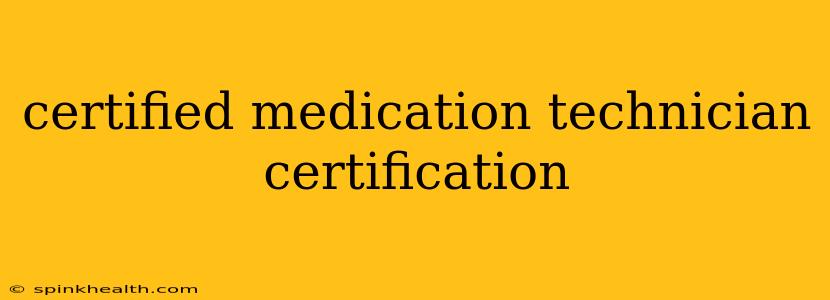The crisp white coat, the quiet concentration, the profound satisfaction of knowing you're making a real difference in people's lives – this is the world of a Certified Medication Technician (CMT). It's a career path that blends meticulous attention to detail with a genuine passion for helping others, and achieving certification opens doors to a fulfilling and impactful role within the healthcare system. But what exactly does it take to become a CMT? Let's explore the journey.
My name is Sarah, and I've been a CMT for over five years. I've witnessed firsthand the importance of accuracy and compassion in this field, and I'm excited to share my insights with you. This isn't just about passing an exam; it's about embracing a commitment to patient care and professional excellence.
What Does a Certified Medication Technician Do?
A CMT plays a vital role in ensuring patients receive their medications safely and accurately. Think of them as the vital link between the pharmacy and the patient. Their responsibilities are multifaceted and critical, including:
- Preparing medications: This involves accurately counting, measuring, and labeling medications based on physician orders. Precision is paramount.
- Administering medications: Depending on the setting (e.g., long-term care facilities, hospitals), CMTs might administer medications directly to patients, always following strict protocols.
- Monitoring medication effects: They observe patients for any adverse reactions or side effects and report these observations to nurses or other healthcare professionals.
- Maintaining accurate records: Meticulous record-keeping is essential, ensuring a clear and auditable trail of medication administration.
- Ordering and stocking medications: In some settings, CMTs assist with inventory management, ensuring sufficient supplies are available.
What are the Requirements for CMT Certification?
The specific requirements for CMT certification vary depending on the certifying organization and the state. However, some common elements typically include:
- Education: Many programs require a high school diploma or GED, along with completion of a certified medication technician training program. These programs cover medication administration, pharmacology, legal and ethical considerations, and patient safety.
- Exam: Candidates must pass a certification exam demonstrating competency in medication handling, administration, and related knowledge.
- Background check: A thorough background check is often required to ensure the safety and well-being of patients.
- Continuing education: To maintain certification, CMTs usually need to complete continuing education units (CEUs) to stay abreast of the latest advancements and best practices.
How Long Does it Take to Become a Certified Medication Technician?
The timeframe varies, but most CMT training programs can be completed within a few months to a year. The time commitment also depends on whether you choose a full-time or part-time program. Once you complete your training and pass the exam, you'll be ready to embark on your career.
What is the Salary of a Certified Medication Technician?
The salary for a CMT can differ based on location, experience, and employer. However, it's a career that offers a competitive wage with the potential for growth and advancement within the healthcare industry.
What are the Job Outlook and Career Advancement Opportunities for CMTs?
The demand for CMTs is strong and growing, making it a stable and promising career path. With experience, CMTs can advance to supervisory roles or pursue further education to qualify for other healthcare positions.
Is CMT Certification Nationally Recognized?
The national recognition of CMT certification varies based on the certifying organization. Always check the credentials and recognition of the program you choose to ensure it aligns with your career goals and meets the requirements of your desired state or employer.
My journey as a CMT began with a desire to help others, and every day, I feel incredibly fulfilled. If you're detail-oriented, compassionate, and committed to patient care, becoming a Certified Medication Technician might be the perfect path for you. It's a career that truly makes a difference. Remember to research different certification programs and choose one that fits your needs and learning style. Good luck!

